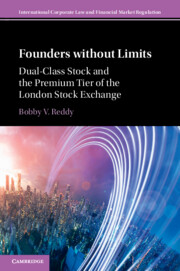Book contents
- Founders without Limits
- Cambridge University Press
- Founders without Limits
- Copyright page
- Contents
- Figures
- Tables
- Preface
- Acknowledgements
- Table of Cases
- Table of Legislation and Regulation
- Abbreviations
- Introduction
- Part I Putting Dual-Class Stock into Context
- Part II Evaluating Dual-Class Stock
- Part III Formulating a Policy on Dual-Class Stock
- 8 The Existing Constraints
- 9 A Balanced Protection Package for Inferior-Voting Shareholders
- Epilogue
- Appendix Comparison of Inferior-Voting Shareholder Protections on Major Dual-Class Stock Exchanges
- Index
8 - The Existing Constraints
from Part III - Formulating a Policy on Dual-Class Stock
Published online by Cambridge University Press: 29 October 2021
- Founders without Limits
- Cambridge University Press
- Founders without Limits
- Copyright page
- Contents
- Figures
- Tables
- Preface
- Acknowledgements
- Table of Cases
- Table of Legislation and Regulation
- Abbreviations
- Introduction
- Part I Putting Dual-Class Stock into Context
- Part II Evaluating Dual-Class Stock
- Part III Formulating a Policy on Dual-Class Stock
- 8 The Existing Constraints
- 9 A Balanced Protection Package for Inferior-Voting Shareholders
- Epilogue
- Appendix Comparison of Inferior-Voting Shareholder Protections on Major Dual-Class Stock Exchanges
- Index
Summary
If dual-class stock does not harm public shareholders, the rationale for excluding dual-class stock from the premium tier crumbles.However, if evidence from other jurisdictions shows that the share price of dual-class firms is excessively discounted, the cost of capital for such firms, if they were permitted on the premium tier, would be high, potentially prejudicing benign controllers, and even deterring flotations or incentivising premature unifications of dual-class stock into one share, one vote.Therefore, any relaxation of the premium-tier rules should be accompanied by public shareholder protections to smooth the introduction of dual-class firms and to reduce their costs of capital.Existing one share, one vote constraints, though, may also effectively constrain dual-class firm controllers.Existing legal and regulatory constraints, such as directors’ duties, related-party transaction regulations, Takeover Code mandatory offer and equality-of-treatment provisions, independent director requirements and conditions around post-IPO recapitalisations, together with psychological constraints could, in some circumstances, protect public shareholders in dual-class, as well as one share, one vote, firms.However, various flaws subsist in such protections, especially in the context of dual-class firms, which cannot be masked by market constraints, such as through the equity, debt and product markets, which are less robust in dual-class firms.
Keywords
- Type
- Chapter
- Information
- Founders without LimitsDual-Class Stock and the Premium Tier of the London Stock Exchange, pp. 311 - 338Publisher: Cambridge University PressPrint publication year: 2021



